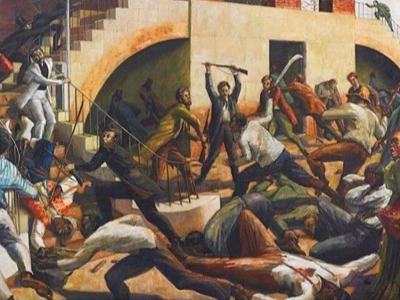In the annals of Caribbean history, few events have been as influential yet overlooked as Fédon’s Rebellion. This insurrection, lasting from 1795 to 1796 in Grenada, was significant in the broader context of the Atlantic Revolutions and the fight against colonial oppression.
The prelude: Grenada under colonial rule
Grenada, a small island in the Caribbean, became a focal point of European colonial ambitions. The island changed hands multiple times, finally becoming a British colony in 1763. By the late 18th century, Grenada’s economy relied heavily on slave labour, with vast sugar plantations dominating the landscape. This set the stage for a dramatic struggle between the enslaved African population, free people of colour, and the colonial authorities.
Julien Fédon: The man behind the rebellion
The rebellion was led by Julien Fédon, a free man of colour who owned a plantation in the Belvidere estate in the parish of St. John. Inspired by the ideals of the French Revolution and the successful slave revolt in Haiti, Fédon sought to challenge the existing social and political order. He envisioned a society where people of colour and former slaves could live with dignity and equality.
The spark and spread of the rebellion
The rebellion ignited in March 1795. Fédon and his followers quickly seized control of much of the island, including the key town of Gouyave. The insurgents established a parallel government, illustrating their intent not just to protest but to revolutionise Grenada’s political landscape.
The British responded with military force, viewing the rebellion as a dire threat to their colonial interests. Grenada became a battleground, with Fédon’s forces demonstrating remarkable resilience and tactical acumen. The rebels managed to hold off the British for more than a year, a testament to their determination and Fédon’s leadership.
The downfall and aftermath
Despite their initial successes, the rebels faced increasing challenges. The British reinforcements, coupled with internal divisions and resource constraints, gradually turned the tide. By the end of 1796, the rebellion was largely suppressed, with Fédon’s fate becoming a mystery; he was never captured, and his ultimate end remains unknown.
The suppression of Fédon’s Rebellion was brutal. The British authorities executed many rebels and re-established control over the island. However, the rebellion had lasting impacts. It exposed the vulnerabilities of the colonial system and inspired further resistance across the Caribbean.
Legacy of Fédon’s Rebellion
Fédon’s Rebellion is more than a historical footnote; it’s a story of resistance against oppression, a fight for dignity and equality. Julien Fédon, though not as widely recognised as other revolutionary figures, was a key proponent of change, challenging the colonial and racial hierarchies of his time.
In modern Grenada, Fédon’s Rebellion is remembered as a pivotal moment in the island’s path towards eventual independence. It’s a testament to the enduring human spirit and the desire for freedom and justice. As historians continue to explore this period, Fédon’s Rebellion serves as a powerful reminder of the complexities and struggles inherent in the fight against colonialism and slavery.





